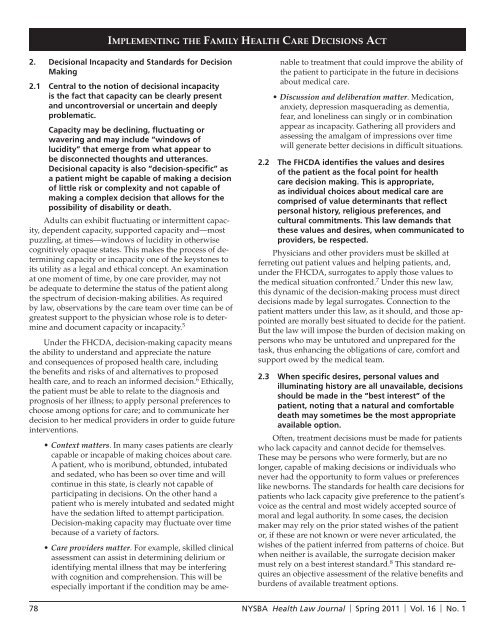Ethics and Clinical Practice Guided by the Family Health Care ...
Ethics and Clinical Practice Guided by the Family Health Care ...
Ethics and Clinical Practice Guided by the Family Health Care ...
Create successful ePaper yourself
Turn your PDF publications into a flip-book with our unique Google optimized e-Paper software.
IMPLEMENTING THE FAMILY HEALTH CARE DECISIONS ACT<br />
2. Decisional Incapacity <strong>and</strong> St<strong>and</strong>ards for Decision<br />
Making<br />
2.1 Central to <strong>the</strong> notion of decisional incapacity<br />
is <strong>the</strong> fact that capacity can be clearly present<br />
<strong>and</strong> uncontroversial or uncertain <strong>and</strong> deeply<br />
problematic.<br />
Capacity may be declining, fluctuating or<br />
wavering <strong>and</strong> may include “windows of<br />
lucidity” that emerge from what appear to<br />
be disconnected thoughts <strong>and</strong> utterances.<br />
Decisional capacity is also “decision-specific” as<br />
a patient might be capable of making a decision<br />
of little risk or complexity <strong>and</strong> not capable of<br />
making a complex decision that allows for <strong>the</strong><br />
possibility of disability or death.<br />
Adults can exhibit fluctuating or intermittent capacity,<br />
dependent capacity, supported capacity <strong>and</strong>—most<br />
puzzling, at times—windows of lucidity in o<strong>the</strong>rwise<br />
cognitively opaque states. This makes <strong>the</strong> process of determining<br />
capacity or incapacity one of <strong>the</strong> keystones to<br />
its utility as a legal <strong>and</strong> ethical concept. An examination<br />
at one moment of time, <strong>by</strong> one care provider, may not<br />
be adequate to determine <strong>the</strong> status of <strong>the</strong> patient along<br />
<strong>the</strong> spectrum of decision-making abilities. As required<br />
<strong>by</strong> law, observations <strong>by</strong> <strong>the</strong> care team over time can be of<br />
greatest support to <strong>the</strong> physician whose role is to determine<br />
<strong>and</strong> document capacity or incapacity. 5<br />
Under <strong>the</strong> FHCDA, decision-making capacity means<br />
<strong>the</strong> ability to underst<strong>and</strong> <strong>and</strong> appreciate <strong>the</strong> nature<br />
<strong>and</strong> consequences of proposed health care, including<br />
<strong>the</strong> benefits <strong>and</strong> risks of <strong>and</strong> alternatives to proposed<br />
health care, <strong>and</strong> to reach an informed decision. 6 Ethically,<br />
<strong>the</strong> patient must be able to relate to <strong>the</strong> diagnosis <strong>and</strong><br />
prognosis of her illness; to apply personal preferences to<br />
choose among options for care; <strong>and</strong> to communicate her<br />
decision to her medical providers in order to guide future<br />
interventions.<br />
• Context matters. In many cases patients are clearly<br />
capable or incapable of making choices about care.<br />
A patient, who is moribund, obtunded, intubated<br />
<strong>and</strong> sedated, who has been so over time <strong>and</strong> will<br />
continue in this state, is clearly not capable of<br />
participating in decisions. On <strong>the</strong> o<strong>the</strong>r h<strong>and</strong> a<br />
patient who is merely intubated <strong>and</strong> sedated might<br />
have <strong>the</strong> sedation lifted to attempt participation.<br />
Decision-making capacity may fluctuate over time<br />
because of a variety of factors.<br />
• <strong>Care</strong> providers matter. For example, skilled clinical<br />
assessment can assist in determining delirium or<br />
identifying mental illness that may be interfering<br />
with cognition <strong>and</strong> comprehension. This will be<br />
especially important if <strong>the</strong> condition may be ame-<br />
nable to treatment that could improve <strong>the</strong> ability of<br />
<strong>the</strong> patient to participate in <strong>the</strong> future in decisions<br />
about medical care.<br />
• Discussion <strong>and</strong> deliberation matter. Medication,<br />
anxiety, depression masquerading as dementia,<br />
fear, <strong>and</strong> loneliness can singly or in combination<br />
appear as incapacity. Ga<strong>the</strong>ring all providers <strong>and</strong><br />
assessing <strong>the</strong> amalgam of impressions over time<br />
will generate better decisions in difficult situations.<br />
2.2 The FHCDA identifies <strong>the</strong> values <strong>and</strong> desires<br />
of <strong>the</strong> patient as <strong>the</strong> focal point for health<br />
care decision making. This is appropriate,<br />
as individual choices about medical care are<br />
comprised of value determinants that reflect<br />
personal history, religious preferences, <strong>and</strong><br />
cultural commitments. This law dem<strong>and</strong>s that<br />
<strong>the</strong>se values <strong>and</strong> desires, when communicated to<br />
providers, be respected.<br />
Physicians <strong>and</strong> o<strong>the</strong>r providers must be skilled at<br />
ferreting out patient values <strong>and</strong> helping patients, <strong>and</strong>,<br />
under <strong>the</strong> FHCDA, surrogates to apply those values to<br />
<strong>the</strong> medical situation confronted. 7 Under this new law,<br />
this dynamic of <strong>the</strong> decision-making process must direct<br />
decisions made <strong>by</strong> legal surrogates. Connection to <strong>the</strong><br />
patient matters under this law, as it should, <strong>and</strong> those appointed<br />
are morally best situated to decide for <strong>the</strong> patient.<br />
But <strong>the</strong> law will impose <strong>the</strong> burden of decision making on<br />
persons who may be untutored <strong>and</strong> unprepared for <strong>the</strong><br />
task, thus enhancing <strong>the</strong> obligations of care, comfort <strong>and</strong><br />
support owed <strong>by</strong> <strong>the</strong> medical team.<br />
2.3 When specific desires, personal values <strong>and</strong><br />
illuminating history are all unavailable, decisions<br />
should be made in <strong>the</strong> “best interest” of <strong>the</strong><br />
patient, noting that a natural <strong>and</strong> comfortable<br />
death may sometimes be <strong>the</strong> most appropriate<br />
available option.<br />
Often, treatment decisions must be made for patients<br />
who lack capacity <strong>and</strong> cannot decide for <strong>the</strong>mselves.<br />
These may be persons who were formerly, but are no<br />
longer, capable of making decisions or individuals who<br />
never had <strong>the</strong> opportunity to form values or preferences<br />
like newborns. The st<strong>and</strong>ards for health care decisions for<br />
patients who lack capacity give preference to <strong>the</strong> patient’s<br />
voice as <strong>the</strong> central <strong>and</strong> most widely accepted source of<br />
moral <strong>and</strong> legal authority. In some cases, <strong>the</strong> decision<br />
maker may rely on <strong>the</strong> prior stated wishes of <strong>the</strong> patient<br />
or, if <strong>the</strong>se are not known or were never articulated, <strong>the</strong><br />
wishes of <strong>the</strong> patient inferred from patterns of choice. But<br />
when nei<strong>the</strong>r is available, <strong>the</strong> surrogate decision maker<br />
must rely on a best interest st<strong>and</strong>ard. 8 This st<strong>and</strong>ard requires<br />
an objective assessment of <strong>the</strong> relative benefits <strong>and</strong><br />
burdens of available treatment options.<br />
78 NYSBA <strong>Health</strong> Law Journal | Spring 2011 | Vol. 16 | No. 1



